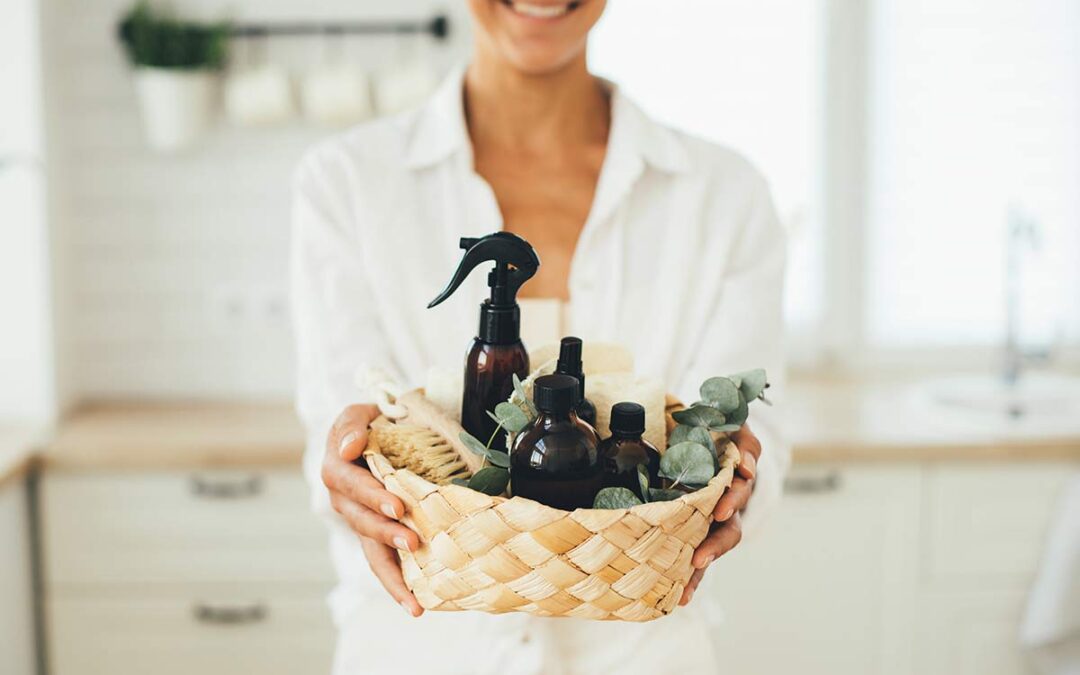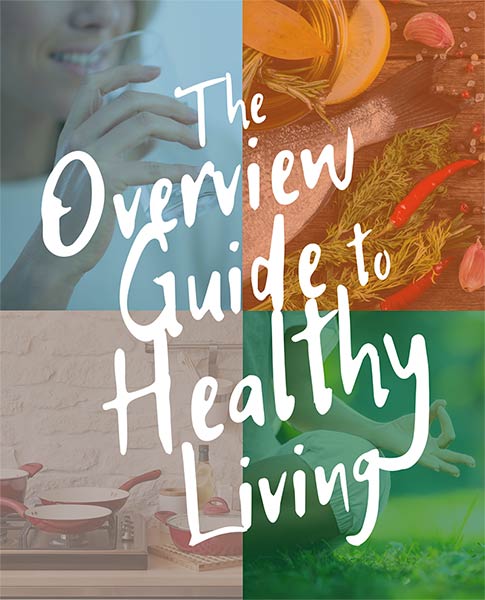Commercial cleaning products are laden with harsh chemicals that are hazardous to our health and the environment (EWG, 2023). This awareness has led to a growing demand for alternative, eco-friendly solutions. Cleaning your home doesn’t have to involve exposing yourself and your loved ones to harmful substances. There are eco-friendly alternatives on the market, and you can also make cleaning supplies with a few ingredients. I have been using essential oils (EOs) to clean and disinfect my home for a few years, and I am thrilled to share my recipes with you.
EOs are very effective for cleaning. Research shows certain essential oils have antiseptic, antibacterial, and antiviral properties. My favorite essential oils for non-toxic household cleaners are clove, tea tree, lemon, and eucalyptus, but endless possibilities exist. I choose these oils because of the research studies behind them. For example, clove has powerful antiseptic properties. It has been shown to have antibacterial, antiviral, and antifungal effects, making it an effective disinfectant for the home (Bai et al., 2023). A study published in the journal Pathogens found that clove oil has antibacterial activity against multidrug-resistant Streptococcus suis (Wongsawan et al., 2019). Tea tree essential oil is another favorite because of its powerful antiseptic properties. It is effective against many bacteria and viruses, including methicillin-resistant Staphylococcus aureus (MRSA) and influenza (Carson et al., 2002). A study published in the Journal of Hospital Infection found that tea tree oil effectively killed several strains of bacteria commonly found in hospitals, including Staphylococcus aureus and Pseudomonas aeruginosa (Carson et al., 2006). Lemon essential oil is a natural disinfectant with a fantastic, fresh, citrusy scent. It is an excellent disinfectant and has antibacterial and antiviral properties. In 2020, a study by Kumar et al. demonstrated that lemon and geranium essential oils effectively against the SARS-CoV-2/COVID-19 virus.
Last but not least, eucalyptus essential oil has been shown to have antibacterial, antiviral, and antifungal properties. It has been used traditionally as a natural remedy for respiratory infections and is effective against several strains of bacteria and viruses. A systematic review of 113 articles by Elangovan and Mudgil (2023) demonstrated that eucalyptus oil exhibited strong antibacterial activity against several strains of bacteria, including MRSA. I combine these four essential oils to make a pleasant disinfectant spray that is an effective natural alternative to harsh chemical disinfectants.
All-Purpose Cleaner
DIY Recipe:
Ingredients:
- 8 oz dark glass spray bottle
- 3/4 cup distilled water
- two tablespoons of vinegar
- 10 drops clove essential oil
- 10 drops tea tree essential oil
- 10 drops lemon essential oil
- 10 drops eucalyptus essential oil
Instructions:
Add each ingredient to the bottle and shake vigorously to combine, and my EO disinfectant spray is created!
Floor Cleaner:
DIY Recipe:
Ingredients:
- 1 cup distilled white vinegar
- 1 cup water
- 1 tablespoon castile soap (unscented or a mild scent)
- 10 drops tea tree essential oil
- 10 drops lemon essential oil
- 5 drops eucalyptus essential oil
- 5 drops clove essential oil
- Spray bottle
Instructions:
In a mixing bowl, combine 1 cup of distilled white vinegar and 1 cup of water. Mix in 1 tablespoon of castile soap. Add the essential oils and stir the mixture well. Transfer the mixture to a clean spray bottle.
Notes:
Shake the bottle before each use. Spray the floor lightly and mop as usual. For hardwood floors, spray a small amount directly onto a mop or cloth rather than the floor itself.
Dish Soap:
- DIY Recipe:
Ingredients:
- 1 cup liquid castile soap (unscented or a mild scent)
- 1 tablespoon washing soda
- 1 tablespoon vegetable glycerin
- 10 drops lemon essential oil
- 5 drops tea tree essential oil
- 5 drops eucalyptus essential oil
- 1 cup distilled water
- Clean, empty dish soap bottle
Instructions:
In a mixing bowl, pour 1 cup of liquid castile soap. Mix in 1 tablespoon of washing soda and 1 tablespoon of vegetable glycerin. Glycerin helps create a smooth texture and adds moisturizing properties. Add the essential oils and stir well to ensure all ingredients are well combined. Gradually add 1 cup of distilled water while continuing to stir. Pour the mixture into a clean and empty dish soap dispenser or bottle.
Notes:
Shake well before each use. If you have hard water, you may need to add more washing soda to enhance the soap’s effectiveness.
Laundry Detergent:
DIY Recipe:
Ingredients:
- 1 bar of unscented castile soap
- 1 cup washing soda
- 1 cup borax
- 15 drops tea tree essential oil
- 15 drops lemon essential oil
- 10 drops eucalyptus essential oil
- 5 drops clove essential oil
- Glass jar
Instructions:
Grate the bar of castile soap using a cheese grater. You can also cut it into small pieces for easier processing. Combine the grated castile soap, washing soda, and borax in a large mixing bowl. Mix well until all ingredients are evenly distributed. Add the essential oils and transfer the mixture into an airtight container for storage. A glass jar with a lid works well. Use 1-2 tablespoons of the homemade detergent per load, depending on the size of your laundry and the soil level.
Note: Always test DIY solutions in a small, inconspicuous area before use.
References
Bai, J., Li, J., Chen, Z., Bai, X., Yang, Z., Wang, Z., & Yang, Y. (2023). Antibacterial activity and mechanism of clove essential oil against foodborne pathogens. Lebensmittel-Wissenschaft & Technologie, 173, 114249. https://doi.org/10.1016/j.lwt.2022.114249
Carson, C. F., Mee, B. J., & Riley, T. V. (2002). Mechanism of action of Melaleuca alternifolia (tea tree) oil on Staphylococcus aureus determined by time-kill, lysis, leakage, and salt tolerance assays and electron microscopy. Antimicrobial agents and chemotherapy, 46(6), 1914–1920. https://doi.org/10.1128/AAC.46.6.1914-1920.2002
Elangovan, S., & Mudgil, P. (2023). Antibacterial Properties of Eucalyptus globulus Essential Oil against MRSA: A Systematic Review. Antibiotics (Basel, Switzerland), 12(3), 474. https://doi.org/10.3390/antibiotics12030474
Environmental Working Group. (2023, September 13). Cleaning Products Emit Hundreds of Hazardous Chemicals, New Study Finds. https://www.ewg.org/news-insights/news-release/2023/09/cleaning-products-emit-hundreds-hazardous-chemicals-new-study
Kumar, K. J. S., Vani, M. G., Wang, C., Chen, C., Chen, Y., Lu, L., Huang, C., Lai, C., & Wang, S. (2020). Geranium and Lemon Essential Oils and Their Active Compounds Downregulate Angiotensin-Converting Enzyme 2 (ACE2), a SARS-CoV-2 Spike Receptor-Binding Domain, in Epithelial Cells. Plants, 9(6), 770. https://doi.org/10.3390/plants9060770
Lozanova, S. (2023, June 22). Better glass & window cleaners. Earth911. https://earth911.com/home-garden/better-glass-window-cleaners/
Wongsawan, K., Chaisri, W., Tangtrongsup, S., & Mektrirat, R. (2019). Bactericidal Effect of Clove Oil against Multidrug-Resistant Streptococcus suis Isolated from Human Patients and Slaughtered Pigs. Pathogens (Basel, Switzerland), 9(1), 14. https://doi.org/10.3390/pathogens9010014

